We had some friends over for dinner one night and our conversation was interrupted by frantic knocking on the front door. It was my neighbor, wearing a worried look on his face. “Your kids are not being safe,” he said. I followed him outside to find my kids and their buddies sitting on the roof of our guests’ van. My neighbor is an emergency room nurse and shared the horrors he’d seen after kids had been hurt in situations just like this. I thanked him for caring enough to tell me, and I asked my kids to get down.
I wouldn’t consider myself a helicopter dad or lawnmower parent. I’m not much of a worrier, either. But more than four in ten parents told Pew Research they consider themselves to be an overprotective parent, compared to just 20% who said they tend to give their children too much freedom. I lean toward the 20-percenters, but not because I don’t care about my children’s safety or development. I just think underprotecting kids leads to their gaining valuable skills. But I think I benefit from this approach, too. Here are 5 benefits of not being an overprotective parent.
1. You loosen your grip.
I’ve seen it too many times—an overprotective parent so invested in holding his kids up that when it comes time for them to walk on their own, they don’t know how. Holding kids too tightly is another way of holding them back. Underprotecting them means developing a pattern of constantly teaching, then letting go. This forces them to grow and you to be less and less involved. My goal is to gradually loosen my grip until my arms are wide open and I have successfully worked myself out of a job.
2. You lengthen their leash.
We needed a house sitter while we went on vacation this year and decided to offer the job to a teenager on our block. I’m thankful her parents said yes! It was a great opportunity for her. She learned how to live on her own for a bit with the safety net of having her mom and dad just a few houses down. Her parents lengthened her leash in a healthy way. Giving kids the freedom to explore and learn while you’re still within reach is the safest way.
3. You get to focus on wisdom.
After you loosen your grip and lengthen your leash, kids will begin exploring what works and what doesn’t. You can now teach them why things work. Underprotecting kids puts you in a position to instill wisdom into your kids. At my house, that means teaching my son and daughters about serving God and loving others. Proverbs 2:6 says, “For the Lord gives wisdom; from his mouth come knowledge and understanding.” Ask God what wise words he wants you to share with your children, and then watch them grow in wisdom, too. Focus on sharing one important lesson with them every day.
4. You learn to trust.
It’s true that your daughter probably won’t do drugs if, as an overprotective parent, you lock her in her room for the entirety of her teenage years. It’s also true that teaching her about consequences and stepping back while she applies those lessons is a great way to build trust. When you underprotect your kids, you gain opportunities to trust them and also learn to trust the foundation you’ve set for them.
5. You develop their independence.
If you’ve ever been to the gym, you’ve seen personal trainers helping people work out. They give advice, recommend lifts, and demonstrate techniques. But one thing trainers don’t do is lift the weights for the client. It wouldn’t help the clients if someone else did the work. They would never become independent. The same goes for kids and parents. Proverbs 22:6 says, “Train up a child in the way he should go; even when he is old he will not depart from it.” Training them up means not doing everything for them but letting them develop independence.
Sound off: Do you feel like more of an overprotective parent or an underprotective one? Why?











Huddle up with your kids and ask, “Has there ever been a time when you felt like I was watching you too closely?”